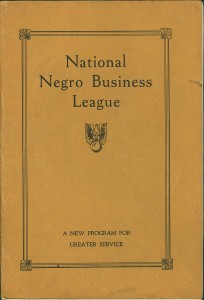 Booker T. Washington (1856-1915), founder and principal of Tuskegee Institute in Alabama, organized the National Negro Business League in 1900 to promote “commercial, agricultural, educational, and industrial advancement … and the commercial and financial development of the Negro.” Washington believed that blacks should “leave political and civil rights alone” in order to “make a businessman of the Negro.”
Booker T. Washington (1856-1915), founder and principal of Tuskegee Institute in Alabama, organized the National Negro Business League in 1900 to promote “commercial, agricultural, educational, and industrial advancement … and the commercial and financial development of the Negro.” Washington believed that blacks should “leave political and civil rights alone” in order to “make a businessman of the Negro.”
Washington was hoping that the League would encourage blacks to start their own businesses, thus proving that they were as capable as whites of economic success. This in turn, Washington reasoned, would eventually lead whites to allow blacks — or at least certain blacks — their right to vote and due process of law. The League’s membership included a number of successful black businessmen (and women) and professionals and a large number of the black middle class “strivers” who hoped to start their own businesses.
  |
Margaret Clifford, Washington’s granddaughter, noted that her grandfather also encouraged women to develop business skills. “He started the National Business League while he was in Tuskegee so people could learn how to start a business, make a business develop and go and prosper and make a profit. When I went to high school, even though he had been dead for some years, his educational practices were still in practice. They explored all the trades. The girls explored cooking, sewing and handicrafts the first two years, and the last two years they specialized.”
The League operated through state and local chapters, many of which were located in the South. League meetings were held to allow small businessmen to make contact with each other, and share stories of their struggles and successes. The league had financial support from white businessmen. Washington used his social and financial access to powerful leaders of the white business elite — including department-store magnate John Wanamaker, steel mogul Andrew Carnegie, and Julius Rosenwald, head of the Sears, Roebuck mail-order company — to support his efforts.